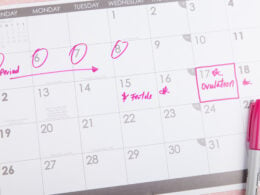Your little girl is growing up. Suddenly she needs a bra, and you’re noticing some mood swings and attitude changes. You expect her periods to start soon.
You decide it’s time to have “the talk” with her. You know… the one where you try to explain what periods are and how her body is changing into a woman.
Unfortunately, for many parents, “the talk” often turns into an awkward one-sided conversation OR never happens because you don’t know where to start.
How should a mom show her daughter that periods are healthy and normal, that they’re okay to talk about, and help her feel comfortable coming forward with any body questions?
How about another approach altogether.
I propose we don’t wait until girls (or boys) are entering puberty and don’t confine the conversation to just one “talk.” Teaching your daughter about periods and her body can be a natural, ongoing conversation, starting when she’s little. If you start the conversation early, by the time your daughter hits puberty, she’ll already have a basic knowledge of what to expect, and will be accustomed to going to her mom for any help she needs.
(The same concept is true for our sons. Let’s be open to explaining things like periods to them when they’re young, so it’s not a weird and mysterious concept when they’re older!)
Two key ways to teach your daughter about periods
There are two main methods to help your daughter learn about her body and make it into a positive experience: First, let her be curious. Second, be a good example for her.
Let her be curious.
Don’t shy away from the topic of periods, puberty, and body processes. It’s best if the mom-daughter health talk becomes an ongoing conversation, and the easiest way for that to happen is to let your daughter’s natural curiosity lead the way.
Let her ask questions and give her good, age-appropriate answers.
Just yesterday, my eight-year-old daughter asked why girls wear bras. Some of the girls in her class have begun wearing them, so we had a conversation about how her breasts will begin to grow and how each girl will begin to change at a different age.
Last year, when I gave birth to my fifth baby, she noticed the big pads I used postpartum so I explained that my body had to heal and clean out everything that had been in my uterus to grow the baby, so it’s normal for moms to bleed for several weeks.
Be a good example.
Some girls are more shy about asking questions, so this makes this second factor more important: let your daughter hear you talk positively about your own body and cycle and let her see you take care of your own body.
Just as you have to eat your vegetables if you expect your daughter to eat hers, you also have to talk positively about your body if you want her to be positive about hers.
The problem is, you may not ever say anything about your period or fertility in front of your daughter, because the topic can be taboo.
My mom never talked to me about periods and so I never went to her with my questions. I didn’t know why I had some bleeding when I was 13 and then nothing again til I was 16 (it would’ve been nice to know that many of the women in my mom’s family didn’t start their period until 16!)
I can’t blame my mom though—I’m sure her mom wasn’t open about periods either. . . or her mom before that. . .
I will not continue that family tradition!
Taking the “taboo” out of talking about periods
I challenge you to talk about your periods, your cycle, and your body, even with just your daughter, so it’s not so taboo. How old were you when you got your first period? What was it like? Have you had struggles with your cycles?
If you can talk about what’s going on with your body, hopefully she will too!
Why not be open with any struggles you have with your period or body, then you can show her how you’re coping with it. Have you gotten help from a NaProTechnology-trained doctor for heavy bleeding? Talk to her about it. Have you learned to eat better to help your PMS? Tell her about it! My eight-year-old daughter knows I’m cutting out sugar to help clear my skin.
If you want a more positive experience for your daughter than you had, be open to talking about periods, body processes, and taking care of yourself. Here’s a few ideas depending on her age.
How to start teaching your daughter about periods…
…if your daughter is still quite young (7 and under):
- Don’t try so hard to hide your periods. It’s ok to explain in a simple way to both boys and girls that mommy bleeds for a few days, it doesn’t hurt her and is normal for grownup women.
- Answer her questions honestly. When she sees your body and asks questions, give her a real answer “Yes, I have hair in my private area. When you get older, you’ll grow hair there too.”
- Use the correct terms for body parts: she has a vagina, her baby brother has a penis (of course, along with this information must come the conversation about how these are private areas and no one else should touch them)
- And don’t be afraid to take this same approach with any little boys in your household, too!
…if your daughter is 8-12:
- Begin talking about how her body will change with puberty. When new things come up with her body, like acne, body odor, or budding breasts, use them as an opportunity to teach her how to care for herself and explain that this is the beginning of her body changing into a woman.
- Explain periods to her: what the purpose of a period is, and what she can expect them to be like.
- Make a period kit together! She’ll feel more confident if she has a pack of everything she’ll need for when her period arrives. She can keep it in her backpack, locker, purse, or gym bag so she feels confident and ready.
…if your daughter has already started menstruating:
- Celebrate it—yes, really! Use it as a special opportunity to have lunch together, or get your nails done together. Keep a positive attitude about her cycle and your own.
- Help her learn what’s normal and healthy. If she has PMS, pain, or heavy bleeding, look for a treatment that will heal the underlying issue.
- Encourage her to track her cycle and emotions. She can keep a simple calendar or journal of when her period starts, along with her energy level and mood each day. She’ll begin to see patterns that will bring her self-awareness and confidence.
- Teach her to chart her cycle. Much more than simply tracking when her period starts, cycle charting will help her understand the hormonal changes of her cycle. Charting her menstrual cycle will open a whole new world of body appreciation and self-confidence, and take away the fear of her period starting without warning.
Starting a good ongoing conversation with your daughter about her fertility health does not mean it has to always feel like it’s going completely right. The most important part of teaching your daughter body literacy and positive body habits is to simply be open to talking about them. You are her best teacher, and you can be the one she is comfortable coming to with questions. She can learn self-acceptance, self-awareness, and confidence with her period by seeing you be bold enough to talk to her about it, and by giving her the tools to understand her body.
Learn more about how to talk to your daughter about periods:
Mother-Daughter online programs that teach fertility awareness for different ages and stages
Additional Reading:
Empowering Teenage Girls to Know Their Bodies: A conversation with Emily Sederstrand
Cycle mindfulness: What happens when you teach fertility awareness to teen girls











